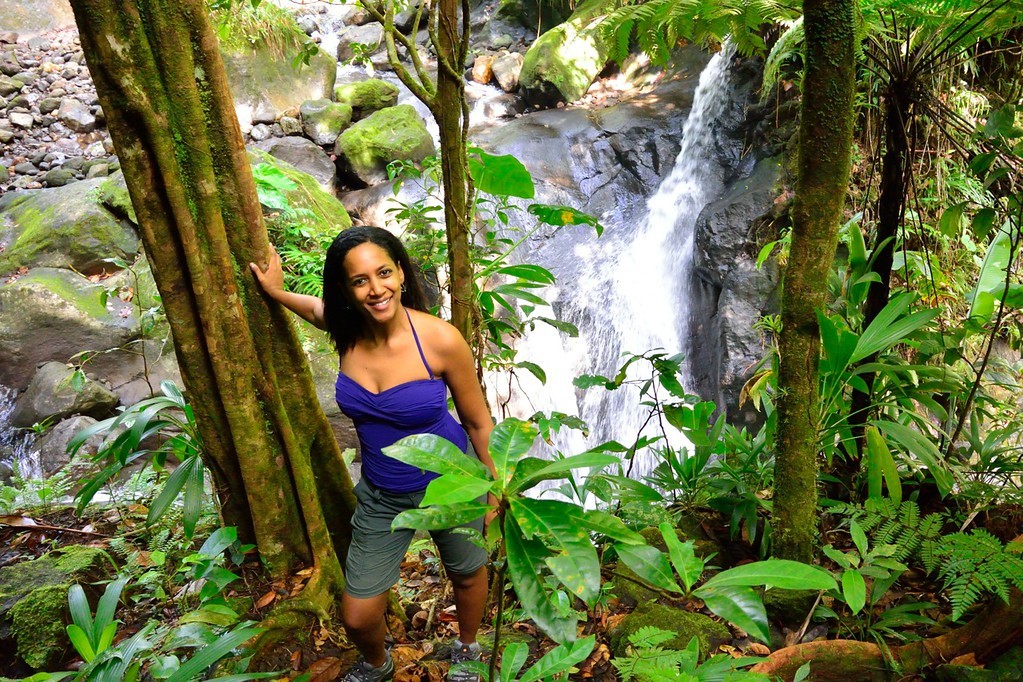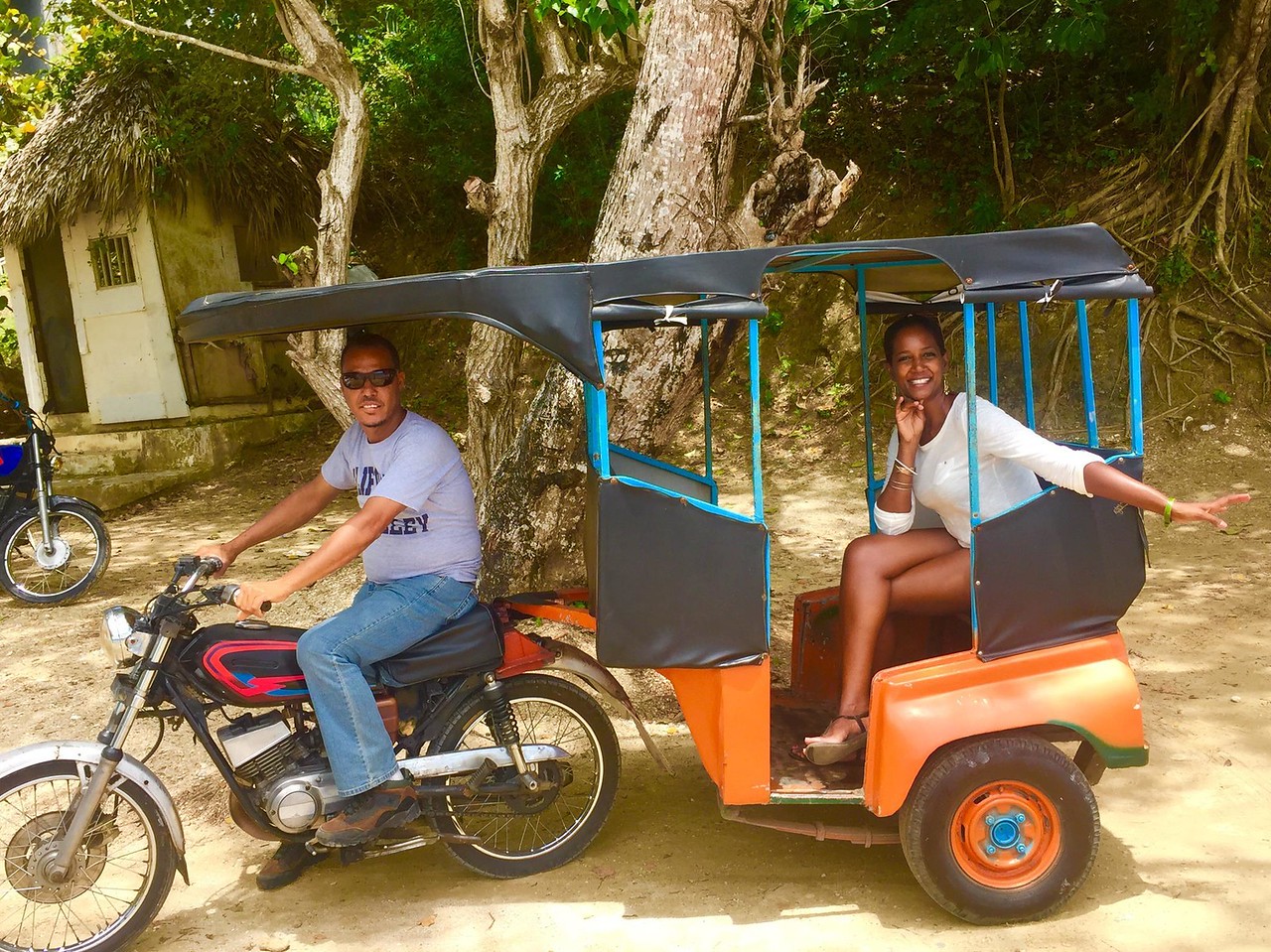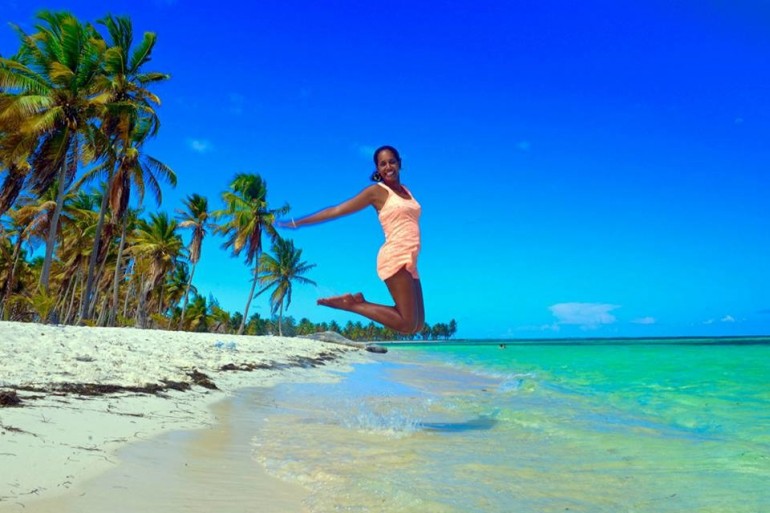Sponsored Listings:
Lebawit and I crossed paths virtually years ago, but it wasn’t until this month that I picked up our email chain to feature her on Legal Nomads. Like fellow lawyers turned writers Katie (who now works at National Geographic) and Erin (a journalist in New York), Lebawit has made a living with the elegance of her words. As alternative careers for lawyers goes, writing is a natural pivot.
I hope you enjoy her interview!
-Jodi
* * *
Alternative Careers for Lawyers: Q&A with Lebawit Lily Girma
Lebawit on Saona Island, in the Dominican Republic
What made you decide to follow a less conventional path than typical law school graduates? Was there a particular moment that catalyzed the decision for you?
I knew as early as my second year of law school that I was meant to take an unconventional path. I had thoughts of practicing public international law and blending travel that way. I’ve always loved to travel and I wanted to follow in my dad’s footsteps in terms of working in international development. That was the reason I went to law school. But there was little guidance on careers that were different from the traditional law firm path, and I had to think about my finances.
So in the beginning, I took the conventional path. I accepted an associate position at a prestigious corporate firm. I was thrilled for the opportunity to learn, and hoped for the best.
A couple of years in, I was unhappy. I had joined the firm right after September 11, and the development, transactional work I wanted to do had become nonexistent. I ended up having to work on what was available: regulatory energy.
I was good at it, but I hated the subject — it was difficult and dull, and it was also a non-diverse practice group. I wanted out, but I didn’t know how to get out. What else would I do? Where would I go, another firm? On the weekends, I would dig for books on alternative legal careers; there were so few of them. I’d brainstorm but I would just end up exhausted… and right back to my desk on Monday.
At work, I took up immigration pro bono cases, which were thankfully billable, and gave me a sense that I was making a difference in someone’s life. And then on vacation days or long weekends, I would travel overseas with friends. To Rome for Thanksgiving, Barcelona for New Year’s, and so on. At least I could afford those trips.
Eventually, at the start of my fifth year of practice, it hit me. I was sitting in my office one morning in January, looked out the window and stared at the pedestrian traffic, and the surrounding concrete buildings. I thought, “In 10 years, you’re still going to be sitting in this chair, miserable with work, and your life will pass you by.”
That was such an overwhelming feeling.
I decided right then and there that I would start preparing for my exit. Even if I didn’t know what I’d do next… I had to get out. I started paying off my debts faster, and saved even more aggressively. The moment I made the decision and took small actions towards it, the next steps came one after the other.
It took me a long time to honor myself as an individual, rather than please my family. That was also because I was helping my parents. But I also think part of it was living up to cultural and societal expectations.
What do you find most fulfilling about your current job?
There are so many fulfilling elements to my work as a travel writer and guidebook author.
I love that I am have the power to help promote local entrepreneurs through my books and photography. I receive messages from local businesses thanking me for the visitors they’re receiving, and that’s gratifying.
I’ve been on the ground long term in my various destinations doing research for my books about Belize, Dominican Republic and Jamaica. And I’m constantly learning and growing as a person.
It’s also fulfilling to meet or hear from readers that they had a memorable trip thanks to my guidebooks. Some of the emails are so emotional, they leave me floored.
I get to travel slow and have access to some incredible places as a travel guidebook writer; that’s a privilege.
Inspiring people to travel is another fulfilling aspect. That folks read my work and view my photos, then actually book and go to a place they’d never thought of visiting before–that’s huge to me.
No two days are the same, and I manage my own time — that’s priceless.
And of course, living in the Caribbean region for work and avoiding Washington DC winters is a major bonus.

Lebawit in Guadeloupe
Do you have any advice for professionals who are interested in leaving conventional private practice but concerned about what is out there?
Be brave, because it can be done.
The first steps are self-analysis, researching and talking to others. Dig deep to figure out what you enjoy doing and what your skills are. Maybe what you want to do doesn’t even exist yet. And if so, that’s OK. Research, talk to other professionals, friends, contacts; ask them what they think you’re good at. Join networks, read, and start putting your work out there (whatever that may be).
You don’t have to figure everything out at once, and you can’t. I used to get stuck thinking I had to come up with that one magic answer or word on what I would do next. It didn’t happen that way. The answer comes after a series of steps. So what’s important is to take one step, one small action at a time. The next step will then unfold until you are steered in the right direction. Sitting and clogging your mind with worry and speculation will make you feel worse.
I started out by deciding I needed a break from seven years of law practice, and took a few months to travel and clear my head. I decided to teach myself photography (because I loved it) while I explored. I read up a lot on what gear to purchase before I left, and how to shoot. That was just step one. The rest followed, bit by bit. It didn’t happen overnight and it took a lot of faith.
So I say go for it, because you only have one life to live. And if you came this far by getting through law school and the bar, then you have the brains to make it happen.
How did your legal education inform the way you see the world today? Do you still identify yourself as a lawyer?
Once a lawyer, always a lawyer I think! Yes, I’m still proud to identify myself as a licensed attorney; there’s an incredible value to a legal education. It’s one of the best decisions I ever made. I use my legal background all the time, even as a travel writer, whether to review my publishing contracts, freelance writing contracts, photo licensing, or knowing how to handle certain environments and people abroad.
It has also given me an ability to observe, be detailed and precise. That’s so important in travel. Engaging in the world around you, knowing how to interview people, and understanding their culture and struggles. Being a lawyer never goes away. It’s a set of skills that make you very sharp minded and analytical. And that’s an incredible thing to have when you’re on the road.
As far as informing the way I see the world today–that comes from my diverse upbringing. I was born in Ethiopia and with Ethiopian parents, but we moved when I was barely one year old to Cote d’Ivoire, a former French colony. I grew up around multiple cultures between home and school, and spoke four languages by the time I was 14, including Spanish. That all came in handy when I had to live in other countries, including Belize, or the Dominican Republic for my guidebook work. Being an expat and going to school in Africa, Europe, and the US–that’s getting a real worldview. Adapting to the Caribbean and Central America for work came easy after that.

Getting a ride home in the Dominican Republic
What do you have to say to those who tell me lawyers can’t have fun?
I’d say they’re wrong! Lawyers work hard, but they know how to enjoy life as well (to balance the stress), and they have a great sense of humor. When I was at the law firm, I found the time to enjoy myself and travel. And in the last five years as a full time travel writer, I’ve had more fun and adventure with my work than I can handle — in Belize, Jamaica, Dominican Republic, Martinique, Guadeloupe Islands, Cuba, Haiti, New Zealand… I can’t remember ever being bored. Last year, a reader emailed me and said I was “the fun maximizer.” 
The post Thrillable Hours: Lebawit Lily Girma, Author and Photographer appeared first on Legal Nomads.
Source: legalnomads.com










